The folks at Lincoln probably thought they had a fantastic car in the latest MKZ, introduced as a 2013 model. They started with the widely praised new Fusion midsize sedan, gave the car unique styling inside and out, and added a few high-tech features not available on the Ford. Yet the reaction from both the automotive press and the general public has been a resounding "meh." What happened? Is the second-generation MKZ simply not good enough, or have reviewers been unfair?
My previous review was based on a test drive of a 2013 Lincoln MKZ with the 2.0-liter turbocharged four-cylinder engine. Figuring that more time in the car might increase my appreciation, and that a different powertrain might suit the car better, I recently spent a week in a 2014 MKZ Hybrid.
I did like the MKZ more this time around. It probably does deserve a better reception than it has been receiving. And yet it's also not hard to see why people aren't more enthusiastic about this car.
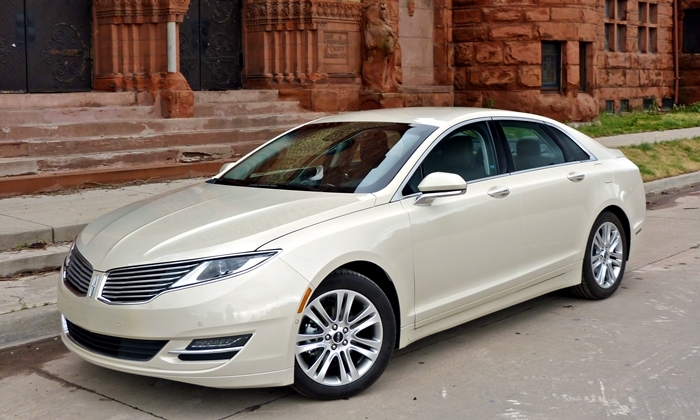
Clean lines from round nose to tapered tail. more MKZ photos
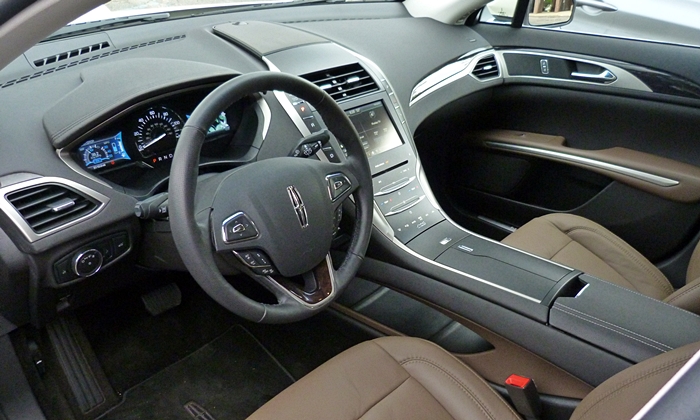
Floating center console dominates the MKZ's interior.
| |
Compared to the ES |
| Price or payments |
 Better
Worse
Better
Worse
|
"Price" as the #1 reason to buy a Lincoln MKZ might come as a surprise. I certainly didn't consider price among the pros initially. After all, the MKZ's reputation as an overpriced Ford is among the primary reasons it does not sell better. And the tested, moderately optioned car listed for the not inconsiderable sum of $42,420. Then I ran the MKZ Hybrid through TrueDelta's apples-to-apples comparisons.
To arrive at the comparison car, I dropped the tested MKZ Hybrid's $695 "platinum dune tri-coat" paint and $195 rear inflatable seat belts, and added a $1,200 sunroof, for a revised bottom line of $42,730. A similarly equipped Ford Fusion Hybrid Titanium lists for $4,000 less. But the Lincoln includes about $3,200 in additional features, among them adaptive dampers, steering-linked LED headlights, a power tilt-and-telescoping steering wheel, a power decklid, and real wood trim. Adjust for these, and the Lincoln emerges a mere $800 higher. Surprisingly close, if you value the MKZ's additional features and especially if you also consider that its warranty is a year longer.
The hybrid does fare better in this price comparison than the regular MKZ because Lincoln thought that marketing the fuel-efficient powerplant as a "no-cost option" would boost the car's sales. Lately this marketing claim isn't as accurate as it used to be. Both variants continue to share a base price, but the sticker on the non-hybrid MKZ adds a $1,000 credit. This remains half the $2,000 upcharge for the hybrid powertrain on the Fusion, and one-third the $2,880 premium for the Lexus ES hybrid. The last seems even larger when you consider that the base engine in the Lexus is a V6. A V6 adds $1230 to the MKZ's price, bumping the bottom line $230 above the hybrid's.
The upshot: a Lexus ES 300h lists for a substantial $6,370 more than the Lincoln MKZ Hybrid. Adjust for the Lincoln's additional features, and its advantage widens to nearly $9,000. The MKZ even undercuts the Toyota Avalon Hybrid by $1,705 despite having about $4,000 in additional content.
Such a value play is usually the province of the Koreans. Alas, Hyundai and Kia don't yet offer a near-luxury hybrid. A Kia Cadenza lists for about the same as the MKZ when both are fitted with V6s, but the Lincoln includes about $3,000 in additional features.
| Feature availability |
 Better
Worse
Better
Worse
|
In every one of the price comparisons I ran the Lincoln MKZ had far more features than the other car. If something's available on a competitor, it's likely available here, and then some.
Standard features include adaptive shocks, a push-button PRND selector, steering-linked all-LED headlamps, LED tail lamps, reconfigurable LCD instrumentation, illuminated door sill trim plates, real wood trim, and a key that can be left in your pocket. Optional features include a self-parking system, adaptive cruise control, multi-adjustable massaging heated-and-cooled front seats, a 700-watt THX-certified audio system, and a full array of collision warning systems.
Lincoln seems especially proud of a huge single-pane panoramic sunroof that retracts over the rear window. Personally, I don't feel this option provides enough of a benefit over the dual-pane panoramic sunroofs offered in competitors to justify its $2,995 price. The huge piece of glass does span nearly the width of the car, but the opening itself is considerably narrower, likely due to the need to package side curtain airbags. A conventional single-panel sunroof is also offered, for $1,200.
Perhaps relevant to more people than the big glass roof: the MKZ is easily the least expensive luxury sedan you can buy with massaging front seats. Others in its price range do not offer the feature. Sadly, this option was not on the tested car.
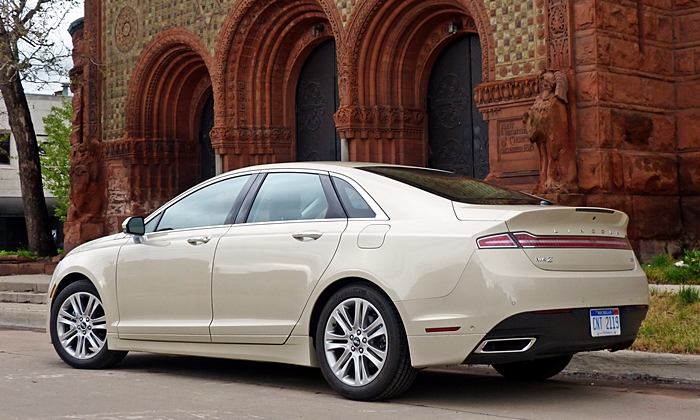
Rear pillar flows cleanly into broad shoulder over rear wheel. Complex surfacing.
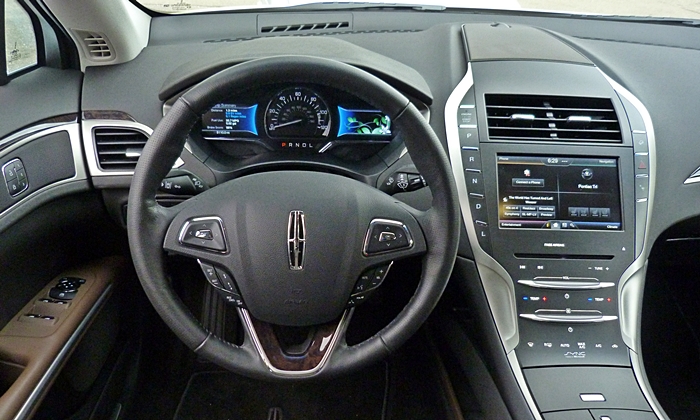
Attractive theme, but too much hard plastic. And controls could be easier to operate.
| Fuel economy |
 Better
Worse
Better
Worse
|
I wavered on whether or not to include fuel economy among the reasons to buy a Lincoln MKZ Hybrid. With the possible exception of its grille, no aspect of the car has been more controversial. As with other current Ford hybrids, owners found they could not match the original EPA estimates, in this case 45 mpg for both city and highway. Ford recently caved to pressure, revising the MKZ Hybrid's EPA ratings downward to 38 mpg city, 37 mpg highway and compensating owners for the difference.
Which numbers are more accurate, the old or the new? Even with a cold start in near-freezing weather Gayla (who works the pedals like the typical American) managed over 34.6 mpg in the suburbs (based on the trip computer). With a trip computer reset after the engine was warm and much more effort put towards maximizing efficiency, I observed 51.6 with a two-way suburban trip. Taking the highway downtown and back, I observed 47.4 mpg.
So the original EPA ratings are doable, just not when driving the car the typical American way, with a heavy foot and the AC blasting. Braking is at least as important as acceleration. Wait too long to start slowing down for a red light, as most Americans do, and the car's kinetic energy will be used to heat the brake rotors rather than being channeled back into the battery pack. When the battery is fully charged, the car can and will cruise for a few miles on electricity alone.
The Lexus ES 300h's EPA ratings are a couple mpg higher than the Lincoln's. My experience with the related Camry Hybrid suggests that the Lexus will also have a real-world advantage, but one small enough to consider them "about the same."
The only other midsize luxury sedans offering similar fuel economy are diesels from Germany, such as the Mercedes-Benz E250 BlueTEC. Though these are much quicker than the hybrids, they are also far more expensive. How much more? If you have to ask...
| Interior styling |
 Better
Worse
Better
Worse
|
With a mantra ray-inspired instrument panel that sweeps down into a floating center console, vibrant displays, and touch-sensitive controls, the MKZ's interior is not only dramatically different from the Fusion's interior, but simply dramatic. Unfortunately, design intent is one thing, design execution another (see the cons below).
Caveats notwithstanding, the Lincoln MKZ's interior styling is less cluttered, more artful, and more distinctive than the Lexus ES's.
| Exterior styling |
 Better
Worse
Better
Worse
|
I similarly admire Lincoln's attempt to give the second-generation MKZ a much more distinctive exterior than the first. The sedan's rounded nose, concave rear pillars, and tapered flanks recall the elegant streamlined locomotives of the 1930s. Even though I remain unsure whether this shape is to my personal taste, it's inarguably stylish and interesting.
Lexus similarly sought to dial up the drama and create distance from a mainstream sibling with the ES's own 2013 redesign, but the resulting exterior design isn't nearly as sleek or as dramatic.
The MKZ's split grille, inspired by that on classic pre-war Lincolns, has attracted more criticism than any other aspect of its design. Some people see a mustache, others a baleen whale. But it's integrated into the oveall design better here than on other Lincolns. And is the spindle grille of the Lexus more attractive?
| |
Compared to the ES |
| Powertrain performance |
 Better
Worse
Better
Worse
|
Partly thanks to active noise reduction, the Ford/Lincoln 2.0-liter hybrid powertrain is smoother and quieter than the 2.5-liter Toyota/Lexus unit. The sound remaining after the electronic countermeasures is a few octaves lower than the buzz in the Lexus.
But the Ford/Lincoln engine is also considerably less powerful. While the Lexus ES 300h can get from a dead stop to 60 mph in a respectable eight seconds, the MKZ Hybrid takes about nine. Though quick by early 1980s standards, a nine-second run registers as sluggish with today's luxury sedan buyer. With either engine, matting the accelerator instructs the CVT to rev the engine to its power peak, then hold it there. Especially in the Lexus, with its louder, buzzier engine, this is not a pleasant experience.
I didn't mind the MKZ Hybrid's limited shove because I generally drove it casually. A 118-horsepower electric motor supplements (and often entirely substitutes for) the 141-horsepower gas engine. Their combined 188 horsepower smoothly and effortlessly shunt the car around town as long as you're not indulging any adolescent fantasies.
If you want to indulge those fantasies, though, you'd better step up to the MKZ's optional 300-horsepower 3.7-liter V6. Or, if you want both power and efficiency, spend the big bucks for a German diesel or an American Tesla.
| Rear seat room & comfort |
 Better
Worse
Better
Worse
|
Rear seat headroom and knee room are borderline tight in the Ford Fusion. In the Lincoln MKZ they're tighter still. Six-foot passengers might still fit, but not comfortably. Even without sufficient space for toes beneath its front seat, the Lexus ES's rear seat is far roomier.
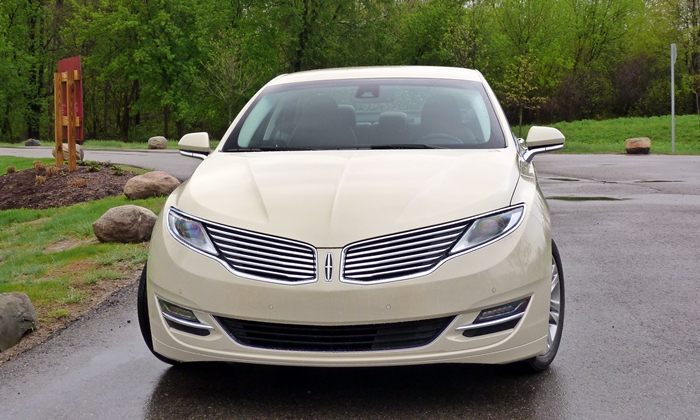
Grille inspired by classic Lincolns has few fans. But it works for me on the MKZ. LED headlights.
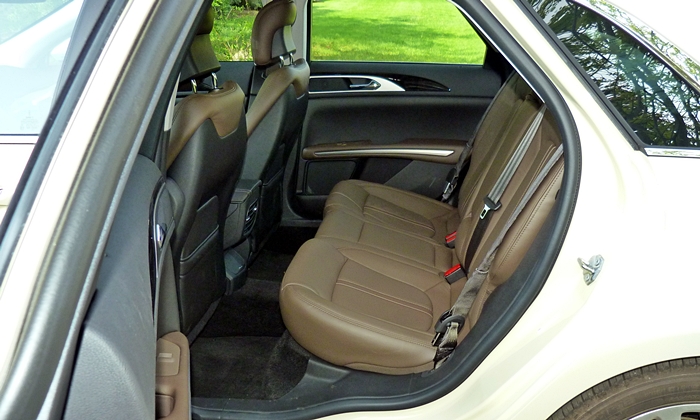
The Lincoln's fatal flaw. Too tight.
| Front seat room |
 Better
Worse
Better
Worse
|
The MKZ's center console might be more stylish and sportier than the one in the Lexus ES, but it's also much higher, and cuts into perceived roominess. People seeking an open, airy interior won't find one in the Lincoln.
As in the Ford Fusion, the base of the MKZ's windshield is high and distant, harming forward visibility and driver confidence. The view forward seems more open in the Lincoln than in the Ford because the instrument panel drops down from the base of the windshield, but it's still far from ideal. In the other direction, visibility is limited by thick rear pillars and, when open, the optional large sunroof.
| Controls and instruments |
 Better
Worse
Better
Worse
|
As in other Fords and Lincolns, the touchscreen-based infotainment interface has improved, but some virtual buttons and touch-sensitive controls remain too small and too closely space to tap without taking your attention off the road for a few potentially critical moments.
I like the number of instrumentation options, and find the driving style evaluator helpful, but clicking back and forth among the various displays becomes tedious.
The instrumentation in the Lexus isn't as thorough or as informative. It doesn't provide a detailed driving style evaluation. And its mouse-like controller also has a fair number of critics.
| |
Compared to the ES |
| Materials & workmanship |
 Better
Worse
Better
Worse
|
Last year I listed materials among the reasons not to buy an MKZ. This time around my evaluation is more mixed. Some materials inside the MKZ are easily worthy of the car's price. The brown hides in the tested car looked and felt richer than most. The sides of the high center console are padded. The same bits in the Lexus are hard plastic.
But the top surface between these padded sides remains hard plastic. It's perhaps as good as hard plastic gets, but doesn't look or feel worthy of a luxury sedan. Most of the fits are precise, but Ford designed the instrument panel trim to not quite align with that on the doors. Consequentially, this particular fit appears shoddy.
| Front seat support & comfort |
 Better
Worse
Better
Worse
|
Seat evaluations are highly subjective. For me, the MKZ's standard front seats are very good, but short of outstanding. Compared to the seats in the Fusion, they're narrower and more firmly contoured, but have smaller side bolsters. The optional multi-contour seats address the bolster deficit, and also add three-level lumbar and massage. But few people are going to drive this car in a manner that requires much lateral support.
| Cargo capacity |
 Better
Worse
Better
Worse
|
The hybrid's battery reduces the Lincoln MKZ's trunk volume from 15.4 to 11.1 cubic feet. The Lexus ES 300h's trunk can hold an extra cube. But if you need much more space the Lincoln's rear seat folds to expand the trunk, while the ES's does not.
| Ride smoothness |
 Better
Worse
Better
Worse
|
The primary benefit of the MKZ's adaptive dampers seems to be a more insulated, even velvetty ride at low speeds than you'll find in the Fusion. Overall the Lincoln feels more luxurious and more composed than the Lexus. It seems quieter, too, especially when accelerating. This said, the MKZ rides a touch hard over some bumps, especially if the chassis is set to "sport."
| Handling |
 Better
Worse
Better
Worse
|
The Ford Fusion tackles imperfectly paved curves with more composure than any other mainstream midsize sedan. The same can be said of the MKZ in its class--as long as we exclude RWD-based sedans from the class.
The Lincoln's multi-mode adaptive shocks have little evident impact on handling. In "comfort," the steering feels lighter than in the Ford, enhancing perceived agility. And, saddled with a 3,828-pound curb weight and semi-buried driving position, the MKZ needs all the enhancement it can get in this area. In "sport," the MKZ's steering feels firmer and tighter, but doesn't provide much more feedback. Unfortunately, the steering and suspension cannot be set separately, so if you want the firm steering you also get a firm ride.
The MKZ most lags rear-wheel-drive competitors (but never the squishier Lexus) when hustled. There's a lot of weight up in the nose with either the hybrid or the V6, and the chassis tuning doesn't do enough to counteract this. Push the MKZ hard, and it plows towards the outside curb. Even in less vigorous driving the MKZ feels nose-heavy, and just plain heavy. Despite its poise, the Lincoln can't quite deliver a sporty driving experience even when fitted with the powerful V6 and all-wheel-drive.
Overall, I enjoyed driving the Lincoln MKZ Hybrid more, even much more than I expected to. Its styling is distinctive and elegant, its interior is mostly well-finished, and it has a more luxurious sound and feel than the Lexus with which it competes. In hybrid form, the MKZ is far from quick, yet this engine somehow best suits the not-quite-sporting character of the midsize Lincoln while returning excellent fuel economy when driven appropriately. The 2.0T engine lacks refinement, while the 3.5-liter V6 encourages comparisons with rear-wheel-drive competitors that the Lincoln cannot win.
So, why hasn't the Lincoln MKZ been more of a success? Well, while it might look and drive better than the Lexus ES, people don't tend to buy the Lexus because of how it looks and drives. They buy it because it has a reputation for reliability, relatively low depreciation, and excellent customer service. And Lincolns don't have much of a reputation in these areas. Plus the MKZ has less interior space than people tend to expect in a 194-inch-long sedan.
People who do buy cars based on how they look and drive tend to favor the European brands, and perhaps Cadillac. Against those competitors the MKZ doesn't compare as well, especially not in performance and handling. But it is also much less expensive and, in hybrid form, more fuel efficient than all save the diesels.
Ultimately, the problem with the MKZ could be that its combination of attributes don't cohere, at least not at a glance. It's more stylish, sportier, and tighter inside than the Lexus, yet still not quite a driver's car, and somehow makes the most sense in sluggish hybrid form. If you can get your head around this combination, and find it appealing, then the MKZ's relatively low price could seal the deal.
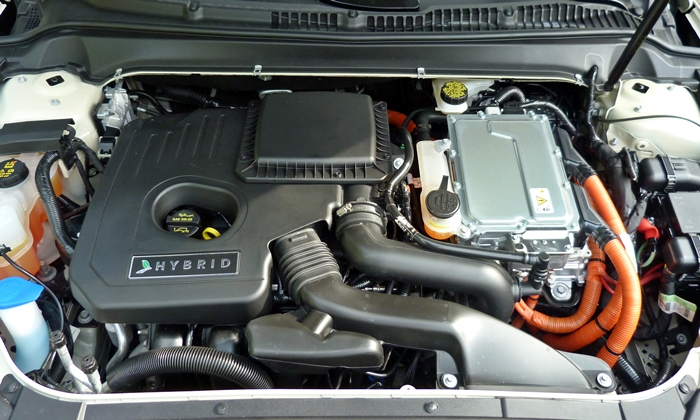
Smoother and quieter than the engine in the Lexus ES hybrid, but less powerful.
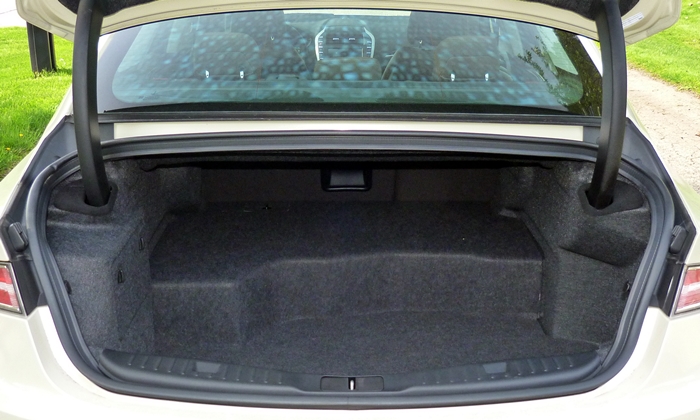
Fairly tight, but at least the rear seat folds.
See more 2014 Lincoln MKZ photos
Lincoln provided an insured car with a tank of gas for a week. Hernando Mejia of Meade Lexus in Southfield, MI, helpfully provided a test drive in a Lexus ES 300h, to refresh my memory of that car. He can be reached at 248-372-7124.











